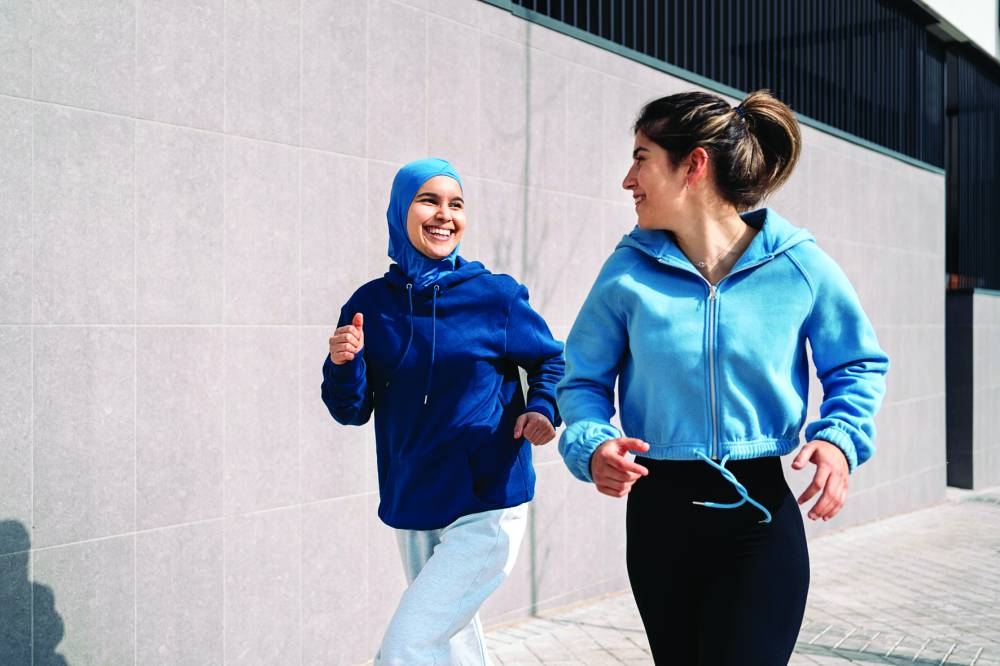Women-only running groups in Qatar are making significant strides in enhancing female participation in sports while thoughtfully navigating cultural expectations according to a study undertaken by Hamad Bin Khalifa University’s (HBKU) College of Science and Engineering (CSE).
The research, spearheaded by Farah Zeyad Ali, a content strategist at Qatar Foundation (QF) and graduating student from the CSE’s Master of Science in Sport and Entertainment Management programme, and supervised by Dr Christos Anagnostopoulos, Assistant Professor in Sport Management and Unesco Chairholder on Governance and Social Responsibility in Sport, explores how these initiatives are reshaping the sporting landscape in Qatar.
As Qatar continues to develop women’s sport participation initiatives in alignment with Qatar Vision 2030, the study examines how grassroots women-only running groups operate within the country’s evolving sporting landscape. The research is particularly timely as QF recently announced plans to transform Education City Stadium into a dedicated sporting hub for women and girls.
The research also addresses Qatar’s significant gender gap in sports, where women account for less than 10% of athletes registered with sports federations. Through analysis of four women-only running groups in Qatar — Athletic Edge, Run the World, The Running Club, and 5am Club — the findings highlight how these grassroots organisations create culturally appropriate sporting spaces that facilitate increased participation among women.
The study involved in-depth interviews with participants across these running groups, including founders, administrators, coaches, and regular members. Half of the interview participants were Qatari nationals, while the other half were expatriate residents, most of Arab/Muslim background, representing diverse perspectives within the women’s running community.
“What we found offers a different perspective on women’s sport development,” explains Ali.
“In Qatar’s cultural context, gender-exclusive environments function not as barriers to overcome but as essential resources that directly enable participation through cultural alignment.”
One major challenge identified in the study is the limited availability of private, women-only spaces, which restricts participation levels. The running groups address this by carefully choosing routes, schedules, and locations that are culturally appropriate. The study also examined how these groups maintain low membership fees to ensure accessibility, often foregoing profitability. Moreover, the importance of culturally knowledgeable coaches was underscored, as they play a key role in meeting the specific cultural needs of participants.
“These women-only spaces are paving the way for sustainable participation that respects cultural values while promoting physical activity,” adds Ali. “Their success underscores the necessity of culturally aligned approaches in sports development.”
Dr Christos Anagnostopoulos, founder of the Unesco Chair on Governance and Social Responsibility in Sport, highlighted the importance of aligning sports development with women’s needs: “Understanding what women in sports truly require is the first step; the next is championing their roles in leadership and decision-making to effect lasting change.” He further emphasised: “The journey to empowering women in sports governance begins with actively
listening to the voices of women athletes — both at recreational and elite levels — and responding to their needs. Decisions impacting women in sports should incorporate women’s insights, fostering a deeper understanding and alignment with their unique perspectives.”
This comprehensive study was conducted under the auspices of the Unesco Chair on Governance and Social Responsibility in Sport, established in March 2023 and embedded within HBKU’s College of Science and Engineering. Through this initiative, the study aimed to contribute to sustainable and culturally aligned enhancements in women’s sports participation across Qatar.
Dr Christos Anagnostopoulos is an assistant professor at Hamad Bin Khalifa University’s (HBKU) College of Science and Engineering (CSE) and Unesco Chairholder on Governance and Social Responsibility in Sport.
(This piece has been submitted by HBKU’s Communications Directorate on behalf of its author. The thoughts and views expressed are the author’s own and do not necessarily reflect an official University stance.)
About Hamad Bin Khalifa UniversityInnovating Today, Shaping TomorrowHamad Bin Khalifa University (HBKU), a member of Qatar Foundation for Education, Science, and Community Development (QF), is a leading, innovation-centric university committed to advancing education and research to address critical challenges facing Qatar and beyond. HBKU
develops multidisciplinary academic programmes and national research capabilities that drive collaboration with leading global institutions. The university is dedicated to equipping future leaders with an entrepreneurial mindset and advancing innovative solutions that create a positive global impact.
One of the longest established colleges at HBKU, the College of Science and Engineering (CSE) graduates the highest number of students and offers the largest portfolio of degree programmes within the University. HBKU’s CSE is home to the supplementary Division of Engineering
Management and Decision Sciences, Division of Sustainable Development, and the Division of Information and Computing Technology, which together form a unique, multidisciplinary education and research environment of the highest calibre. For more information about HBKU’s CSE, visit https://www.hbku.edu.qa/en/cse
Opinion
HBKU research explores impact of women-only running groups on Qatar’s sporting landscape
CSE study emphasises importance of enhancing female participation in sports

A cheerful Muslim woman wearing hijab running in the street with her friend and having fun.
